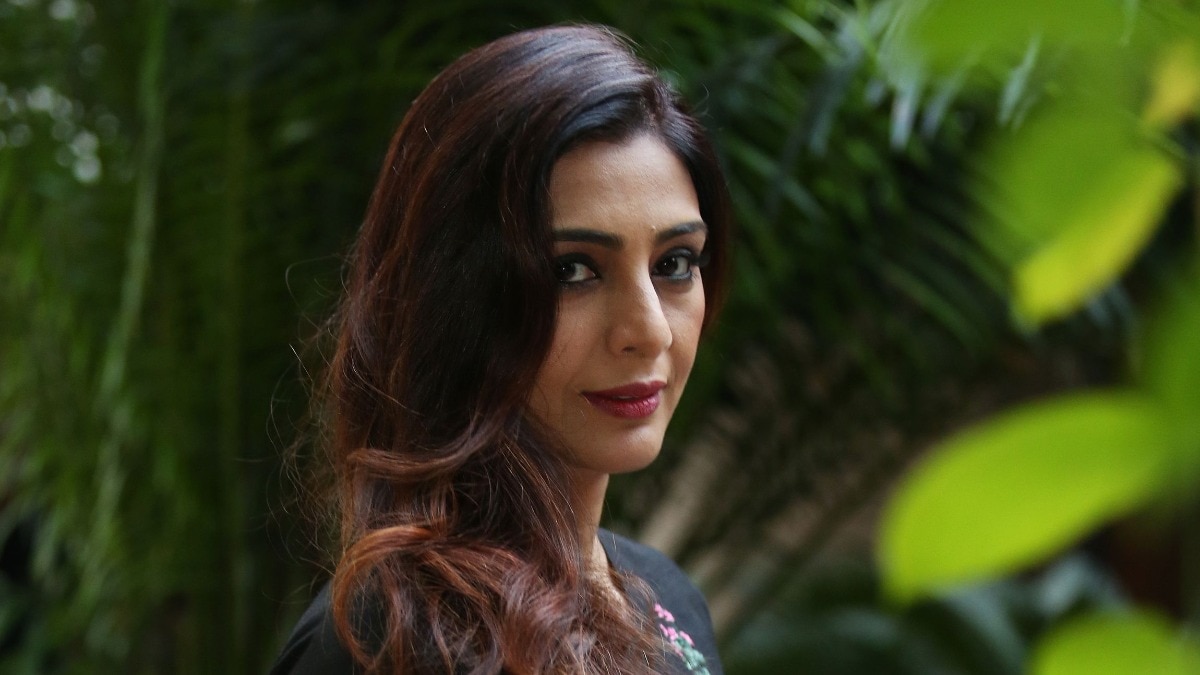How Tabu mastered the art of essaying complicated women on-screen
From 'Astitva' to 'Haider' and 'The Namesake' to 'Andhadhun', Bazaar India shines the spotlight on the many shades of layered women the actor-first star has played so far.


Some actors are like fine wine and films the bottles that contain them. They take the shape of the story, moulding themselves to the narrative. And then there are some wines that age so beautifully with time that the bottle begins to take on their flavour and essence, becoming a mere vessel for their quality. If anyone embodies this, it is undoubtedly Tabu. For nearly three decades now, the legendary actor has masterfully portrayed the most complex of characters, but what has stayed consistent throughout is her rare brand of subtlety and intensity while delivering deeply nuanced, authentic performances that leave audiences always wanting more.
Mass turns to class in the 90s
At a time when many of her contemporaries were typecast and doing big-budget films with all the song and dance and bells and whistles of the times, Tabu was choosing instead to take on roles that defied conventions. Having done her fair share of mainstream movies starring alongside the likes of Ajay Devgn in Vijaypath (1994), which earned her the Filmfare Award for Best Debut (Female), and Haqeeqat (1995), Saif Ali Khan and Akshay Kumar in Tu Chor Mein Sipahi (1995) and Govinda in Saajan Chale Sasural (1996), it was films such as Maachis (1996), Virasat (1997), and Astitva (2000), that marked the beginning of her era of playing more complex, layered characters that challenged social norms and explored the intricacies of the full spectrum of human emotion.
Cut to the present day, and while audiences and their preferences have changed, what's stayed constant is Tabu's ability to push boundaries. Choosing to make her mark with extraordinary, unconventional roles has seen the actor become the symbol of experimental cinema in a space that is distinctly her own, not just in Indian films but in Hollywood as well.
In Maachis, a political thriller, Tabu played Veerandra, a woman embroiled in the political turmoil of the 1980s. The film saw her character transform from a young woman—innocent and docile—to a jaded cynic internalising her anger, pain, and grief to the point where it spoke more than words and actions.
A year later came Virasat (1997) where she played Gehna, a woman caught between her duties as a wife while dealing with the complexities of family, loyalty, love, and the power dynamics in a patriarchal household. Forced to confront the truth of her husband’s past and come to terms with it, Tabu as Gehna managed to deliver a performance that struck the exact balance of grace and strength and won her very first Filmfare Award in the Best Actress Critics category.
Her character, Malini, in Astitva, saw her deal with the many complexities of love and identity in a highly conservative household. Her emotional range—from guilt to defiance and regret to reconciliation was a triumph in capturing the internal conflict of a woman torn between what she wants to do and what has to do. The role, celebrated for its depth and maturity, gave Malini a voice in a world where women had none and saw Tabu receive her third Filmfare Award in the Best Actress Critics category.
In each of these roles, Tabu played women who were real—with all their vulnerabilities and flaws—defying the stereotype of the heroine seen in other movies of that decade. As it turned out, it was only a sign of things to come.
The game-changer that was 'Chandni Bar'
Playing the role of Mumtaz, a naive, displaced woman forced into a life of hardship and survival in a Mumbai dance bar is as complex as it gets. Tabu, however, did more than rise to the challenge in Chandni Bar, giving a masterclass in depth and subtlety. Despite being thrust into a world where she was exploited as she danced and served drinks, Mumtaz hung on to whatever dredges of hope she could muster for a better future. Even as she fell in love with a gangster only to be repulsed by his life of crime, she tried her best to protect her children from it—a scenario that sharpened the contrast between her desires and realities. One witnessed the complexities of a woman who, despite being consumed by the darkness around her, continued to search for light in her own way, with Tabu delivering a performance that’s one of her most remarkable.
When Shakespeare became child’s play for Tabu
Then came the partnership that would be one for the ages. Under the directorial lens of Vishal Bharadwaj, the actor played the Shakespearean roles of Lady Macbeth (from Macbeth) and Gertrude (from Hamlet) in the films Maqbool and Haider, respectively. In Maqbool, she played Nimmi, the mistress of a powerful underworld don, who is both a source of temptation and the reason for Maqbool's (played by Irrfan Khan) downfall. Her character was a victim in one scene and a perpetrator in the next as she navigated the emotional complexities of love and loyalty in a world filled with crime. Watching Tabu blend tenderness with manipulation as Nimmi, who is both complicit in the scheming and desperate for change while torn between loyalty and desire, was another fine example of her vast range. As Ghazala in Haider, her nuanced portrayal captured the emotional depth and inner turmoil of a mother caught in a web of loyalty, love, and betrayal. Her performance in the film went on to become one of her most memorable roles.
Unpredictability at its best in Andhadhun
While the black comedy thriller by Sriram Raghavan centred around Ayushmann Khurrana, Tabu’s performance as Simi in the film was truly a masterclass in playing morally complex characters. Entangled in a web of deceit and murder, Tabu’s Simi was central to the plot and added immense intrigue with her overt charm and sophistication harbouring deep and dark secrets. Be it planning a murder or faking her innocence, Tabu’s performance had her expertly navigating the film’s tension between comedy and suspense.
What makes Tabu stand out is her enigmatic beauty, sure, but also her remarkable ability to balance strength and vulnerability, subtlety and intensity, mystery and clarity—all at once. Whether playing a wife in a complex relationship, or a mother struggling with guilt, just when you think you've peeled back the layers, you'll find there's more to it.
Tabu's international appeal while staying true to her roots
It's not just in India; Tabu has made a name for herself in Hollywood by dancing to her own rhythm. Whether in The Namesake (2006), Life of Pi (2012), A Suitable Boy (2020), to name a few, what remains consistent despite the diversity of characters, is how her roles have displayed a deep connection to her Indian roots, yet have managed to transcend cultural boundaries by conveying universal themes effortlessly.
Take The Namesake, for instance, where Tabu plays Ashima Ganguli, an immigrant mother trying to find her place in America. What Tabu managed to do with the character was strike a chord with audiences across boundaries simply because of how she conveyed emotions such as displacement and identity, which do not need any language to be understood. With time, she has created a body of work that today resonates with the entire world and makes her one of the most compelling and versatile actors in the global cinematic landscape.
An allure that everyone's drawn towards
From filmmakers to audiences, everyone loves Tabu and it's not hard to see why. For starters, the actor has been acing for decades now the two elements that make for consistently great storytelling—authenticity and depth. She clearly enjoys taking on a challenge and essaying roles that defy the norm. It's almost as if her presence in the film alone validates for both the director and the viewer that they will witness an actor at the peak of her powers, regardless of genre. It's easy for anyone paying close attention to see how she manages to speak volumes so understatedly, adding multiple layers of intrigue and profundity to her character and, consequently, to the film. Where else would one find an actor whose performances combine beauty, emotional complexity, intellectual integrity, versatility and technique so seamlessly?
And that, right there, is why Tabu's magic endures—she continues to stay with viewers long after the film has ended.
Lead image: Getty Images
Also read: Tabu returns to Hollywood after 12 years with ‘Dune: Prophecy’, a prequel to the Dune series
Also read: Birthday Special: November-born actors and their best movies to watch this month










